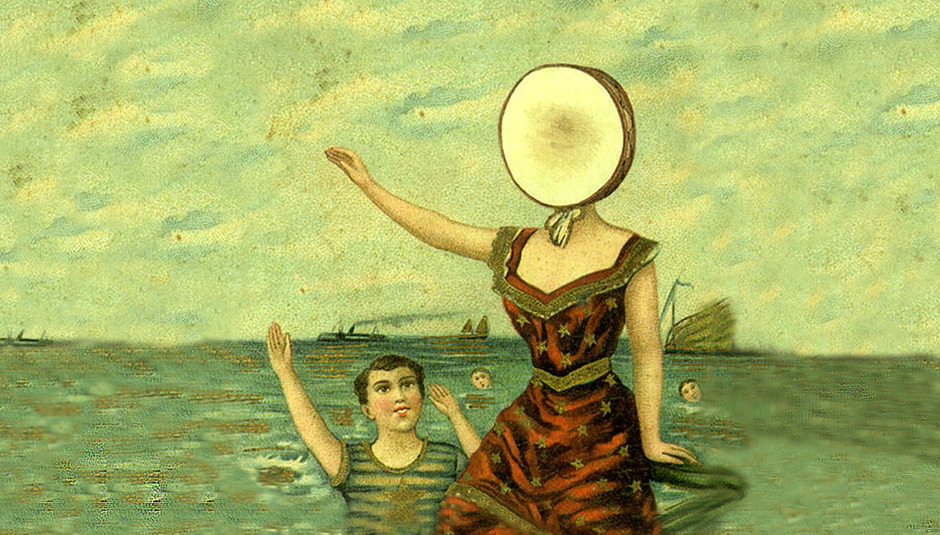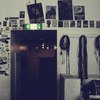I wasn’t greatly surprised by the vocally underwhelmed response of some on my Twitfacebooker-o-scope to news of Neutral Milk Hotel’s reunion on Monday. In recent years, the group have become indelibly linked to a certain indie-rock stereotype other indie-rock stereotypes like to drub (not least so they can affirm they’re not that kind of indie-rock stereotype): the librarian, the sensitive type, with lyrics scrawled on their ever-present notepad, and possibly wearing glasses. A certain kind of emo. Twee. Well, if you saw out your teen years being not even a little bit twee and never copying a lyric down because it meant everything in that moment, there’s a corner of Life’s Rich Pageant forever denied to you.
More damagingly, their magnum opus In The Aeroplane Over The Sea, now a decade and a half old, is belatedly blamed for a wealth of pop crimes that followed in its wake, from the keening earnestness of Sufjan Stevens (who’s happened upon enough remarkable goodness like Detroit! Lift Your Weary Head! to absolve him of most crimes) to the smarmy, indigestible ooze of Mumford & Sons (nah, can’t think of any redeeming features, they’re all yours), to any grouping of fops with ukeleles and cardigans and the first blush of facial hair. I can see the point, but I can’t get behind it. That serpentine, unlikely, unexpected brilliance which so endeared me to Aeroplane back in 1998, the unguarded beauty of Jeff Mangum’s lyrics, isn’t present in their pretenders. That which makes them wonderful is that which defines them from the mulch for which they’re blamed.
I can understand why you’d dislike Aeroplane. Mangum’s voice, which I find bewitching, could be argued as shrill; certainly, on 'Oh Comely', it often takes on a weaning, rasping quality, veering away from the melody in some dark ecstasy. I can understand why you might hate that. Mangum’s lyrics can seem, on first listen, as random, oblique and nonsensical as the group’s name, a further jumble of ill-fitting words leading nowhere but pseudo-psychedelic selfindulgenceville. The instrumentation – busker’s guitar, carnival organ, accordion, euphonium, flugelhorn… I know these are the instruments that soundtrack mobile phone ads enveloping you in cosy faux-folksiness as a juggling unicyclist pedals along a beach festooned with fairy lights. I know.
And I know that the reverence the album currently enjoys hangs like a massive turd around its neck for some listeners. Truth is that for a generation In The Aeroplane Over The Sea sits on their iPod like a totem, talisman or signifier as surely as battered paperbacks of Catcher In The Rye did in the knapsacks of generations before. I can easily imagine kids, buzzed on their first viewing of Garden State, slipping a pair of headphones on their ears of their wannabe-beau and whispering "Neutral Milk Hotel will change your life," as the opening strums of 'The King Of Carrot Flowers Pt 1' strike up. Thing is, The Shins never changed anybody’s life; I can imagine that Neutral Milk Hotel have.
It wasn’t always like this. Over the past fifteen years I’ve watched Aeroplane grow from obscure gem to cult favourite to whatever the hell it is now, mostly organically, mostly via ‘word of mouth’ (albeit considerably enabled by occasional rereleases, the UK iteration of which was at least necessary seeing as their UK label Blue Rose went out of business not too long after putting Aeroplane out). While the album enjoyed some recognition in the US upon release, the UK press – save for Phil McMullen at stalwart ‘zine Ptolemaic Terrascope – mostly slept on In The Aeroplane Over The Sea. I know I tried to get the group attention in the Melody Maker, who I wrote for at the time, but was told that after some office wag had described the album as sounding like the work of "that panpipe band off The Fast Show" nobody could take it seriously anymore.
In 1998, I was a raving proselytiser (a mode I’ve always found comfortable) for the group, having caught them playing support to kindred Athens, Georgia neo-psychedelicists The Olivia Tremor Control at London’s Garage. I was at the time wholly obsessed with maddeningly prolific Ohio lo-fi godheads Guided By Voices, so both bands’ lysergic indie-rock was firmly in my wheelhouse, though I remember OTC leaving me cold, too academically in love with 68 to make my pulse quicken in 98. Or maybe I was still too dumbstruck by their support act to be paying enough attention.
Because Neutral Milk Hotel were truly remarkable. Mercury Rev’s Deserter’s Songs had yet to add the singing-saw to their genre’s lexicon, so its presence onstage, along with the aforementioned litany of oddball instruments, was novel. The band themselves waltzed on like bug-eyed Ken Kesey freaks refracted through a collegiate prism, and one member – Scott Spillane, credited on the album for trumpet, flugelhorn, trombone and euphonium – looked, with his large sad eyes and bristling neckbeard, like he’d just crawled out of the hobbit’s bough. There was a touch of Tolkein about him.
I remember them being quite drunk, though on what I’m not sure, and it may very well have just been high spirits. Certainly, they lashed through their songs that night with a winning abandon; there was nothing prim or restrained about them. Sure, they might’ve carried the tools of the tedious folk hootenannist, but the joyous Athenian cyclone of King Of Carrot Flowers Pts 2 & 3 segued from brass-bolstered reverie into a thrashy blitz of fuzz-bass, fuzz-guitar, fuzz-everything, hurtling with screws rattled loose like it might collapse any moment.
It did collapse, several times, drummer Jeremy Barnes – he of A Hawk And A Hacksaw – tumbling into a series of rolling tom-tom flourishes with the giddy canter of a young Keith Moon, then finding himself unable to tumble back into the song, whereupon he held his drumsticks above his head for a few seconds, listening to the band, before picking up the beat again, with a grin that was pure intoxication in the moment. I remember Jeff launching himself triumphantly into Barnes’ kit at the set’s end, demolishing it. I remember writing in an ‘End Of Year’ roundup in The Times that Christmas, that NMH sounded like a Salvation Army band responding lustily to their first taste of booze.
I was in love, and I didn’t even know the half of it.
Lyrics have often been a weak spot for me, and it was some months later that I learned of Aeroplane’s back story, its ‘rock opera’ quotient. It’s not immediately apparent, Mangum’s vividly impressionistic spree not easily parsed, his narrative a cobbled path of jarring and obtuse imagery. Live, and during my first spins of Aeroplane, I took them on psychedelic face value, simply savouring lines like "Semen stains the mountain-tops", and "So make all your fat fleshy fingers to moving", and "Now she's a little boy in Spain, Playing pianos filled with flames on empty rings around the sun" simply for their cadence and their surrealism and their absurdism.
I loved the words, but it wasn’t the words I loved primarily. The sound of Neutral Milk Hotel is what seduced first, that earnest folkiness dispatched with a haywire chaos, the righteous, frazzled thrum of Holland, 1945 buzzing with enough electricity that I could holler along to its opening volley, "The only girl I ever loved was born with roses in her eyes, But then they buried her alive one evening, 1945", without wondering who this girl was, why she’d been buried alive, or what any of it meant, if anything. A few months on, the larger framework of In The Aeroplane Over The Sea became clear to me, thanks primarily to Postal Blowfish, a Guided By Voices internet fan community, where there was discussion of a momentous interview Mangum had given to US zine Puncture, where he said that "A lot of the songs on the album are about Anne Frank." Before recording Neutral Milk Hotel’s debut album, 1996’s On Avery Island, Mangum revealed he’d been "wondering, ‘If I knew the history of the world, would everything make more sense to me or would I just lose my mind?’ And I came to the conclusion that I'd probably just lose my mind. The next day I went into a bookstore and walked to the wall in the back, and there was The Diary of Anne Frank. I'd never given it any thought in my entire life. I spent two days reading it and then completely flipped out… I would go to bed every night and have dreams about having a time machine and somehow I'd have the ability to move through time and space freely, and save Anne Frank. Do you think that's embarrassing?"
This, in essence, is the story the songs of In The Aeroplane Over The Sea unfurl, sort of. Like most works of ‘rock opera’, narrative is often sacrificed in passing, telling a story rightfully second place to more immediate, inchoate impulses. Certainly I don’t feel too much of a dunce not gleaning the concept to the album any earlier than I did, though once I did it was a ‘when you see it you’ll shit bricks’ moment, like finally seeing the veiled object from a 90s 3D ‘hidden image’ poster (a skill I’ve yet to master in real life).
This knowledge lends a haunting depth to lyrics that had earlier seemed simply Burroughsian cut-ups assembled thusly for Mangum’s perverse pleasure. Mangum’s fantasy is heard clearest on 'Oh Comely' – the album’s only real moment of minor-chord melancholy, an eight minute, one-take performance so intense you hear a distant studio voice yell "hoooooooly SHIT!" at its conclusion – where, five minutes in, Mangum murmurs "I know they buried her body with others, Her sister and mother and 500 families… I wished I could save her in some sort of time machine." But it’s echoed throughout, in Holland 1945’s final exhale, "It’s so sad to see the world agree they’d rather see their faces filled with flies, When all I’d want is to see white roses in their eyes", in the closing Two Headed Boy, Part 2’s "And in my dreams you're alive and you're crying… Rings of flowers 'round your eyes, And I’ll love you for the rest of your life".
It’s in context of the album’s story that its larger themes take shape, its evocation of loss, of bereavement, of unthinkable evil, and the fragile flashes of beauty, joy and love inbetween. This "Soft silly music is meaningful, magical", more profound than the emo stoner daydream it might initially appear (Mangum was teetotal throughout, meanwhile). But one does not need to know the narrative of In The Aeroplane Over The Sea to appreciate its charms, anymore than one needs to know Zen Arcade’s homeless junkie punker parable to be moved by Pink Turns To Blue or Whatever. It’s not a great album because it alludes to Anne Frank, but because of what Mangum draws out of his concept.
The next time I saw Neutral Milk Hotel, headlining at the Camden Underworld later that same year, would be the last time I saw Neutral Milk Hotel. It was, in fact, one of their last ever shows, though there was little sense that night that this was a group on borrowed time, that Mangum was about to fall silent. Mostly, I remember the show’s conclusion, as the group improvised a cacophonic and deeply psychedelic reverie while Mangum, calmly ecstatic, incanted that this was an anthem to the sun. It was one of the greatest things I’ve ever seen.
The group would soon disband, and Mangum suffered a nervous breakdown, and disappeared from view. In the meantime, In The Aeroplane Over The Sea’s reputation swelled, and Mangum grew to be viewed as a modern-day Brian Wilson figure, shoehorned into the pop-cultural stereotype of the troubled, brilliant artist, the Icarus who flew too close to the sun, a paradigm that’s profoundly unhealthy, as is its sick attraction to the record collector mindset. That’s why I imagine many who weren’t there during Neutral Milk Hotel’s brief blossom of brilliance look upon the group’s subsequent phenomenon with distaste. It is distasteful, and my greatest joy at NMH’s reunion – as reunions for the most part are disappointing – is that Jeff must be feeling better now, must have made some peace with whatever was tormenting him.
But In The Aeroplane Over The Sea doesn’t deserve to be overshadowed by Mangum’s subsequent travails, by the way the group’s template was misheard, misunderstood and mistranscribed by their followers. That serpentine, spectral quality that has charmed listeners for fifteen years isn’t for everyone, but it isn’t a mirage. And if you find it, chances are you’ll cherish it.
You will find more by Stevie Chick over on his blog. And you can respond or follow him on Twitter @stevie_chick.






















